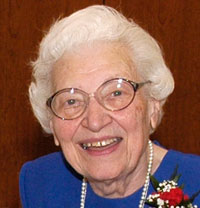School of Nursing building to be named for Signe Skott Cooper

An architect’s rendering depicts the new School of Nursing building. Groundbreaking for the facility is set for April. (Rendering by Kahler Slater Architects)
Signe Skott Cooper’s generosity and lifelong commitment to the University of Wisconsin–Madison will be recognized when the university names the new School of Nursing building in her honor. The UW System Board of Regents approved the naming today (Friday, Feb. 10).
In 2000, Cooper — a UW–Madison graduate — was inducted into the American Nurses Association Hall of Fame. In 2003, Cooper was named a “Living Legend” by the American Academy of Nursing.

Cooper
(Photo: Bob Rashid)
“We are deeply honored to name the new School of Nursing building Signe Skott Cooper Hall,” says UW–Madison School of Nursing Dean Katharyn A. May. “Signe is one of the school’s most ardent and dedicated supporters, and her long career in Wisconsin nursing education embodies the essence of Wisconsin nursing and the Wisconsin Idea. She is one of nursing’s greatest national resources and has helped make the profession what it is today.”
“Signe Skott Cooper’s career is a sharply etched reminder of the extraordinary gift of this [Wisconsin] idea to your state and well beyond,” says School of Nursing graduate and former University of Calgary Nursing School Dean and Provost Joy Calkin. “Naming our new building Signe Skott Cooper Hall may just remind us where the emphasis of our programs and our work outside the university must be if we are to be the best we can become. Signe embodies those things for me in her person and in her professional leadership.”
The $52.2 million School of Nursing Building will be built just south of the School of Pharmacy. It will feature classrooms, clinical simulation laboratories and research and office space.
Cooper was born in 1921 in Iowa. Her family moved to Middleton, Wis. in 1937, and Signe graduated from East High School in Madison.
She enrolled at the School of Nursing, and upon licensure as a registered nurse in 1943, enlisted in the Army Nurse Corps and served in the China-Burma-India theatre during World War II.
Upon her return in 1946, she accepted a position at University of Wisconsin Hospital as head nurse on the obstetrical service, and completed her BS degree. In 1948, she was appointed as an instructor in the School of Nursing, and was promoted to assistant professor in 1951. While teaching full time, she also pursued graduate education at Teachers College and later at the University of Minnesota, earning a master of science degree.
In 1955, Cooper joined the faculty of the Extension Division (later known as UW Extension) and held a joint appointment in the School of Nursing. For two years, she was the only nurse faculty member in extension and was literally a ‘one woman department’, developing and offering credit courses in ward management and teaching for nurses across Wisconsin.
Cooper was involved in a number of innovative programs over the next decade, including the development of extension courses in death and dying, and care of the elderly — areas that were not added to university nursing curricula until years later.
In 1966, Cooper developed one of the first distance-delivered courses at Wisconsin, broadcasting lectures from Old Radio Hall on the Madison campus to more than 600 nurses at 24 “listening posts” across Wisconsin. This program was later expanded through the Educational Telephone Network to reach all 72 counties and 170 listening posts.
Cooper was a leader in professional nursing throughout her career. She wrote two nursing textbooks and edited three others. In recognition of her leadership, she received numerous awards, including the Pioneer Award from the Adult Education Association, the American Nurses’ Association Honorary Recognition Award for her leadership in continuing nursing education, and election to the American Academy of Nursing.
After her retirement in 1983, Cooper developed a new field of expertise — nursing history. During the next 15 years, she became the School of Nursing’s resident historian. She began a history of the school, and published more than 100 brief biographies of nurses. In 1981, Cooper received the Presidents’ Award from the American Association on the History of Nursing for her contributions to the field.
Following the death of her sister Hilda in 2000, Cooper pledged her own estate and that of her sister to the UW Foundation to support the construction of a new facility for the School of Nursing.
Her gift, the largest individual gift received in the school’s campaign, combines with lead gifts from the University of Wisconsin Hospital and Clinic, University of Wisconsin School of Medicine and Public Health, and the Rennebohm Foundation, to total $8.2 million, nearly half of the $17.4 million in private support for the facility.
In her memoir, Cooper wrote: “I have told Dean Katharyn May that my goal is to live long enough to see the completion of the new Nursing Sciences Center. What a thrill that will be!”
Groundbreaking for the new building is April 21 and the building’s completion is slated for 2014.
– By Philip Davis




